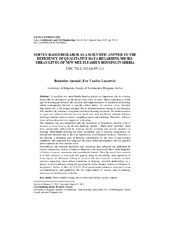Приказ основних података о документу
Survey-based research as a scientific answer to the deficiency of qualitative data regarding micro-urban level of new multy-family housing in Serbia
| dc.creator | Antonić, Branislav | |
| dc.creator | Vaništa Lazarević, Eva | |
| dc.date.accessioned | 2020-04-23T19:49:33Z | |
| dc.date.available | 2020-04-23T19:49:33Z | |
| dc.date.issued | 2017 | |
| dc.identifier.issn | 0354-4605 | |
| dc.identifier.issn | 2406-0860 | |
| dc.identifier.uri | https://raf.arh.bg.ac.rs/handle/123456789/618 | |
| dc.description.abstract | In socialist era, multi-family housing played an important role in creating decent life for proletariat as the main social class in cities. Mass-construction of this type of housing put forward the creation and implementation of standards in housing, which consequently formed a specific urban fabric in socialist cities. Socialist Yugoslavia was a bit unique example due to decentralization during its last decades. This enabled the existence of regional and local housing standards. The differentiation in space was reflected thereby in every local unit, with locally-set relations between buildings and their plots as well as neighbour street and buildings. Therefore, different micro-urban characteristics appeared in housing. This situation was just intensified with the dissolution of Yugoslavia, leaving a lot of freedom to local level to do its own housing “policy”. These local “policies” have been significantly influenced by growing market economy and private incentive in housing. Multi-family housing has been favourable type of housing construction for new private investors due to the best exploitation of all related resources. Therefore, it has become a dominant type of housing construction. In the case of micro-urban conditions, this approach has triggered the entire urban development and has sparked public opinion in some extreme cases. Nevertheless, the relevant legislative and statistical data adopted and published by official institutions, such as competent Ministries and Statistical Office of the Republic of Serbia, is scarce, inaccurate and scientifically limited. Thus, the aim of this research is to find solutions to overcome this gap by using the knowledge and experience of local experts in urbanism. Taking in account that this research is based on their opinions regarding micro-urban conditions in housing, selected methodology is a survey. It was conducted among the participants of the Summer school of urbanism in Kragujevac, Serbia, in May 14-15 2015. Their professional opinion is analyzed to form recommendations and guidelines for the improvement of current state in housing planning and development in Serbia. | en |
| dc.language.iso | en | sr |
| dc.publisher | Univerzitet u Nišu | sr |
| dc.relation | info:eu-repo/grantAgreement/MESTD/Technological Development (TD or TR)/36034/RS// | |
| dc.relation | info:eu-repo/grantAgreement/MESTD/Technological Development (TD or TR)/36035/RS// | |
| dc.rights | openAccess | sr |
| dc.rights.uri | https://creativecommons.org/licenses/by-nc-nd/4.0/ | |
| dc.source | Facta Universitatis, Series: Architecture and Civil Engineering | sr |
| dc.subject | Multi-family housing | sr |
| dc.subject | Micro-urbanism | sr |
| dc.subject | Serbia | sr |
| dc.subject | Survey | sr |
| dc.subject | Experts | sr |
| dc.title | Survey-based research as a scientific answer to the deficiency of qualitative data regarding micro-urban level of new multy-family housing in Serbia | en |
| dc.type | article | sr |
| dc.rights.license | BY-NC-ND | sr |
| dcterms.abstract | Ваништа Лазаревић, Ева; Aнтонић, Бранислав; | |
| dc.citation.volume | 15 | |
| dc.citation.issue | 1 | |
| dc.citation.spage | 29 | |
| dc.citation.epage | 41 | |
| dc.citation.rank | M24 | |
| dc.identifier.doi | 10.2298/FUACE170202001A | |
| dc.identifier.fulltext | https://raf.arh.bg.ac.rs/bitstream/id/1644/2571-18868-1-PBFACTABAntonicEVanistaLazarevic.pdf | |
| dc.type.version | publishedVersion | sr |

